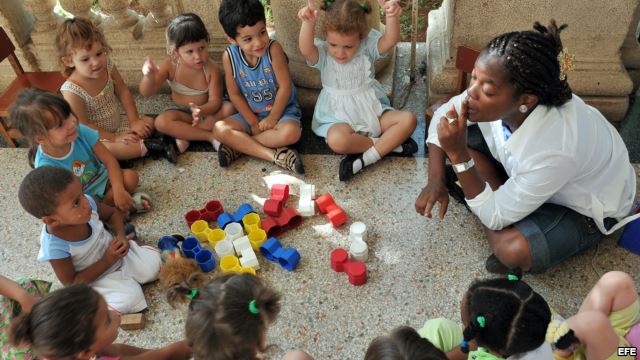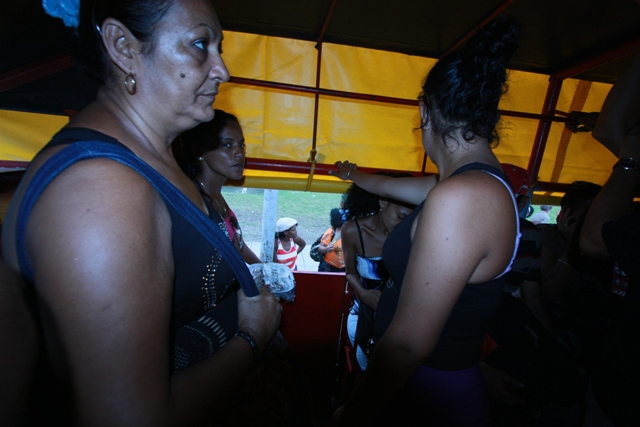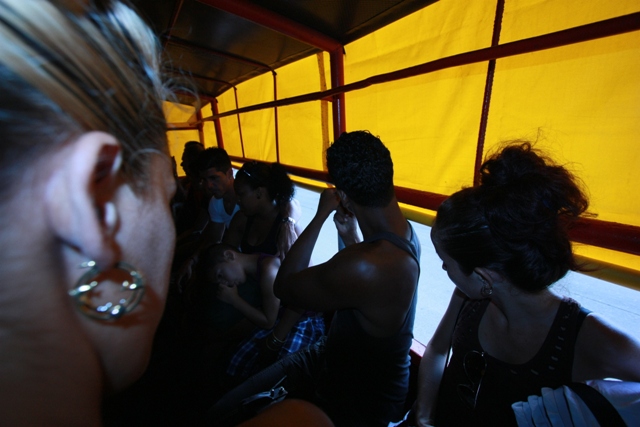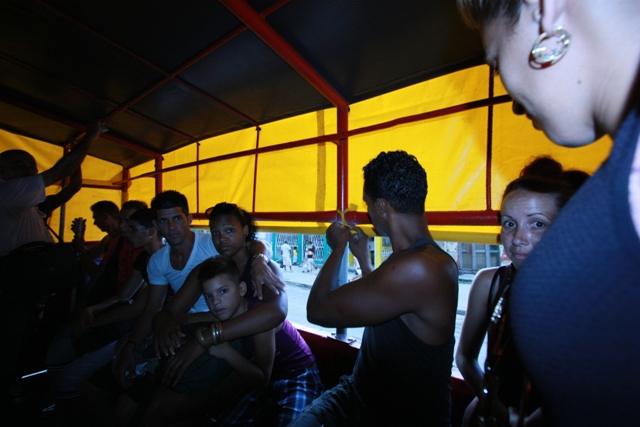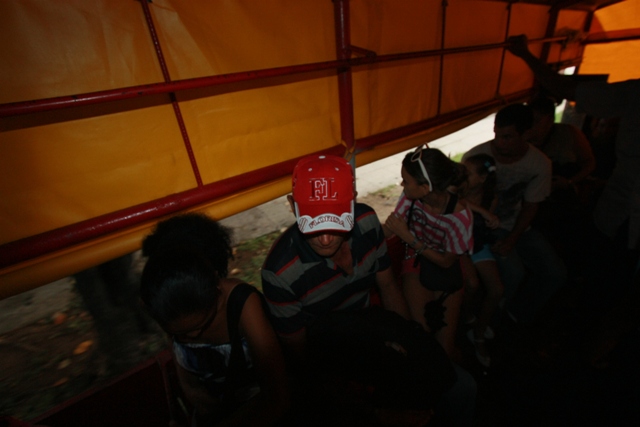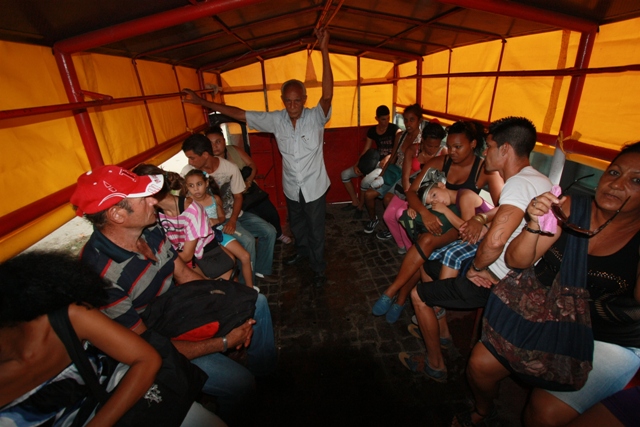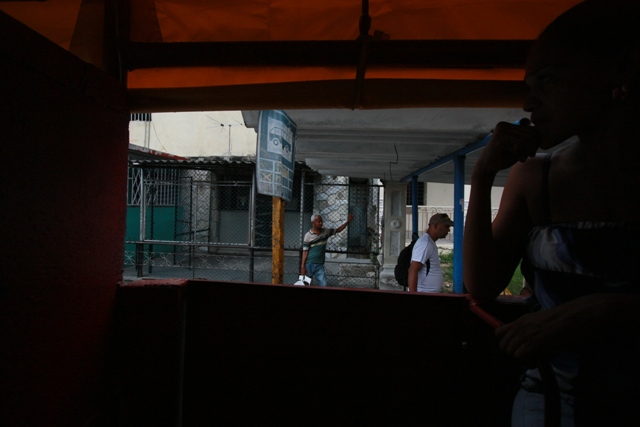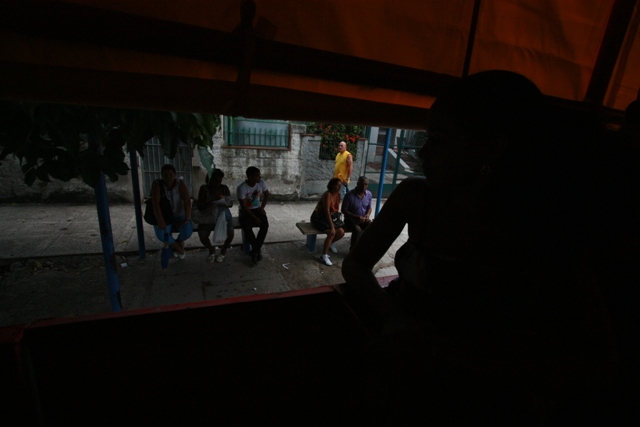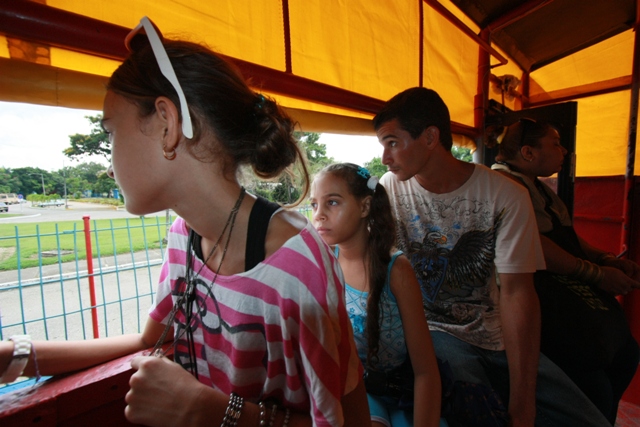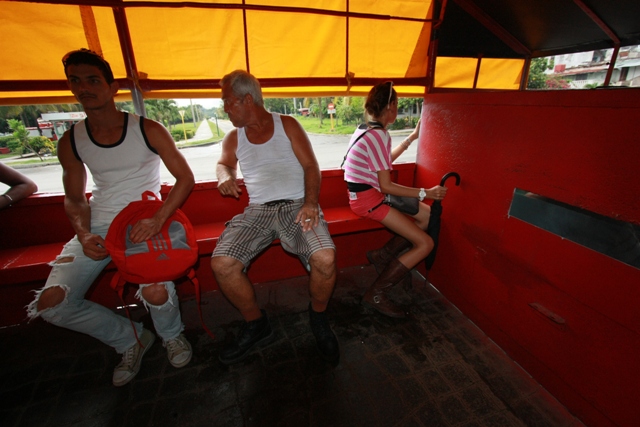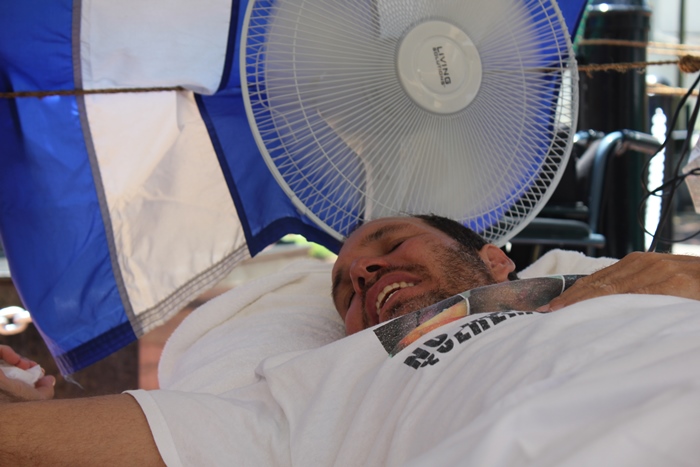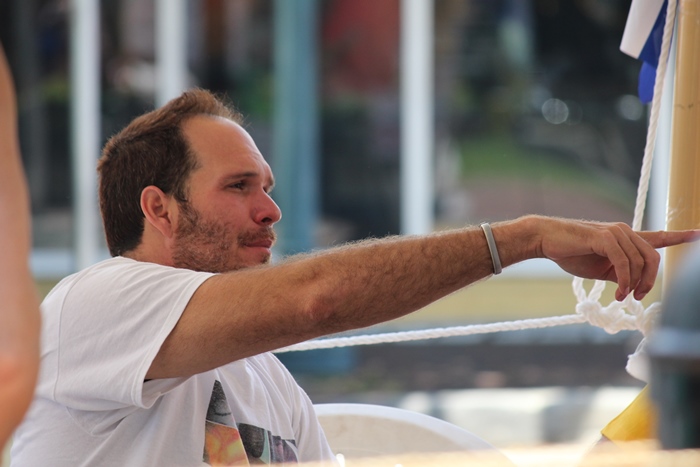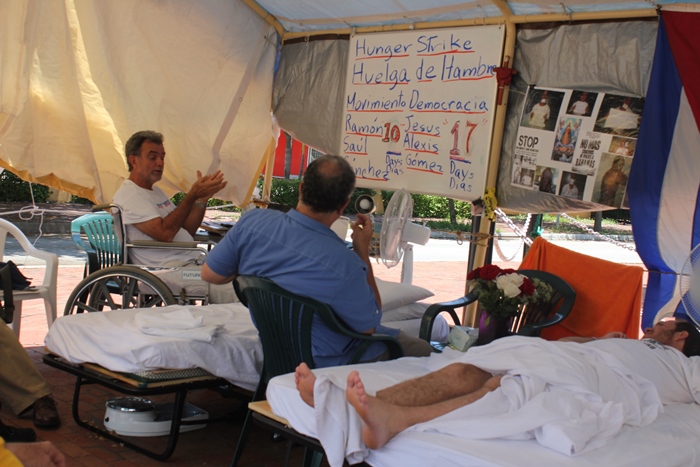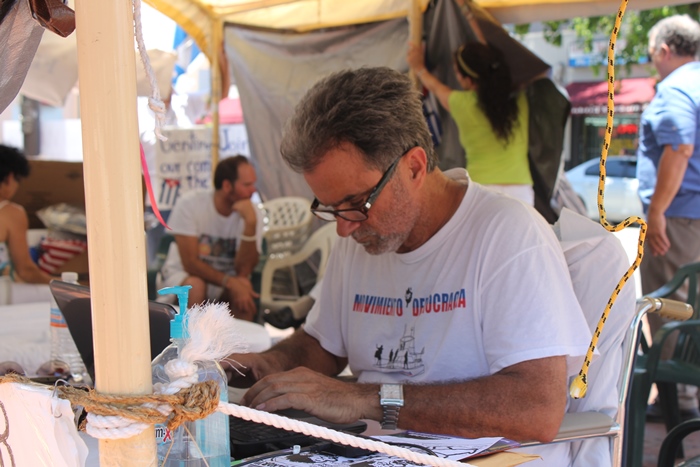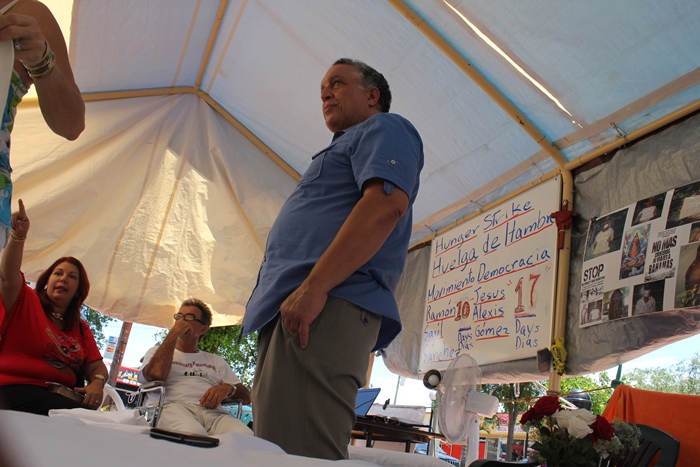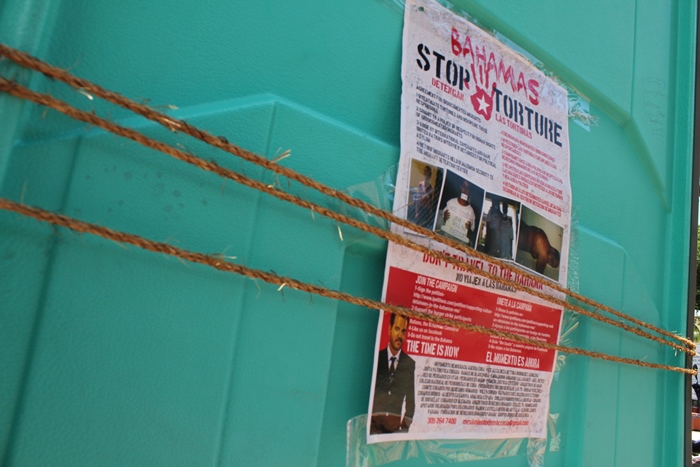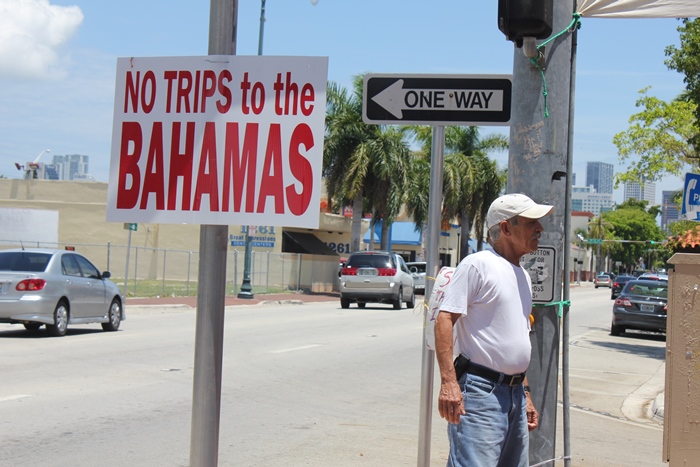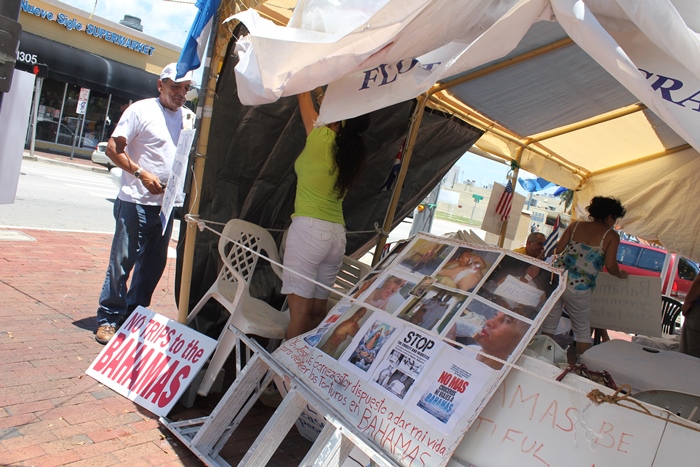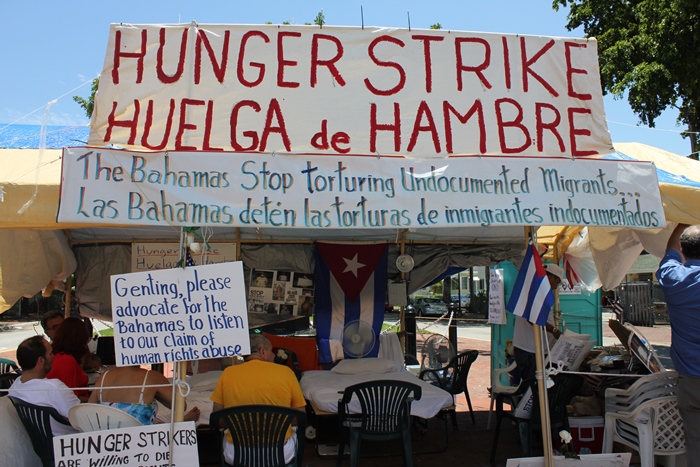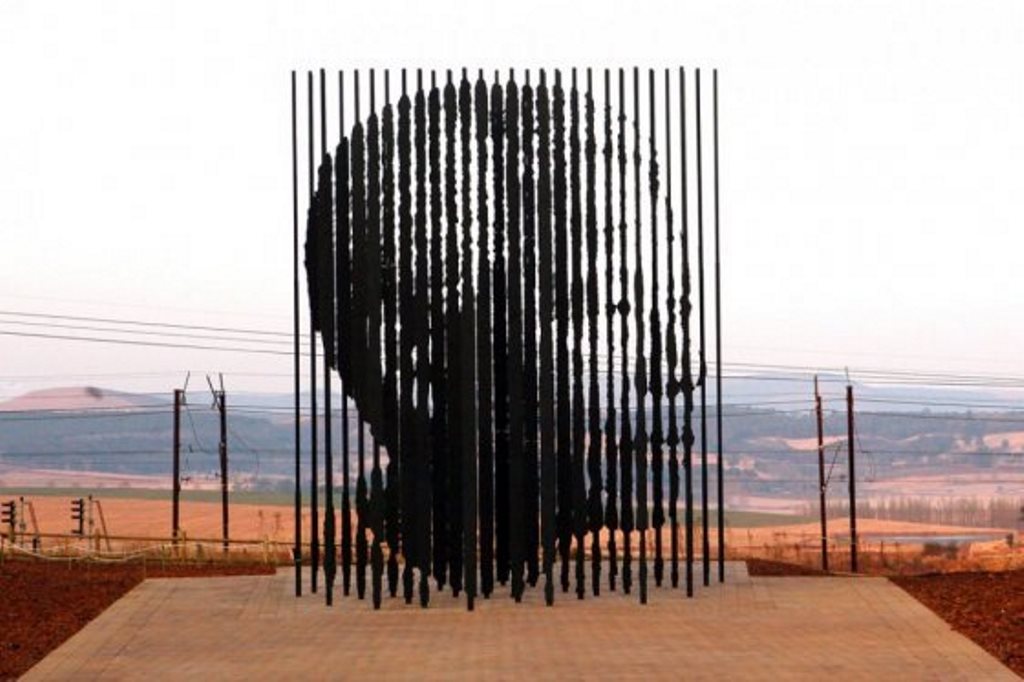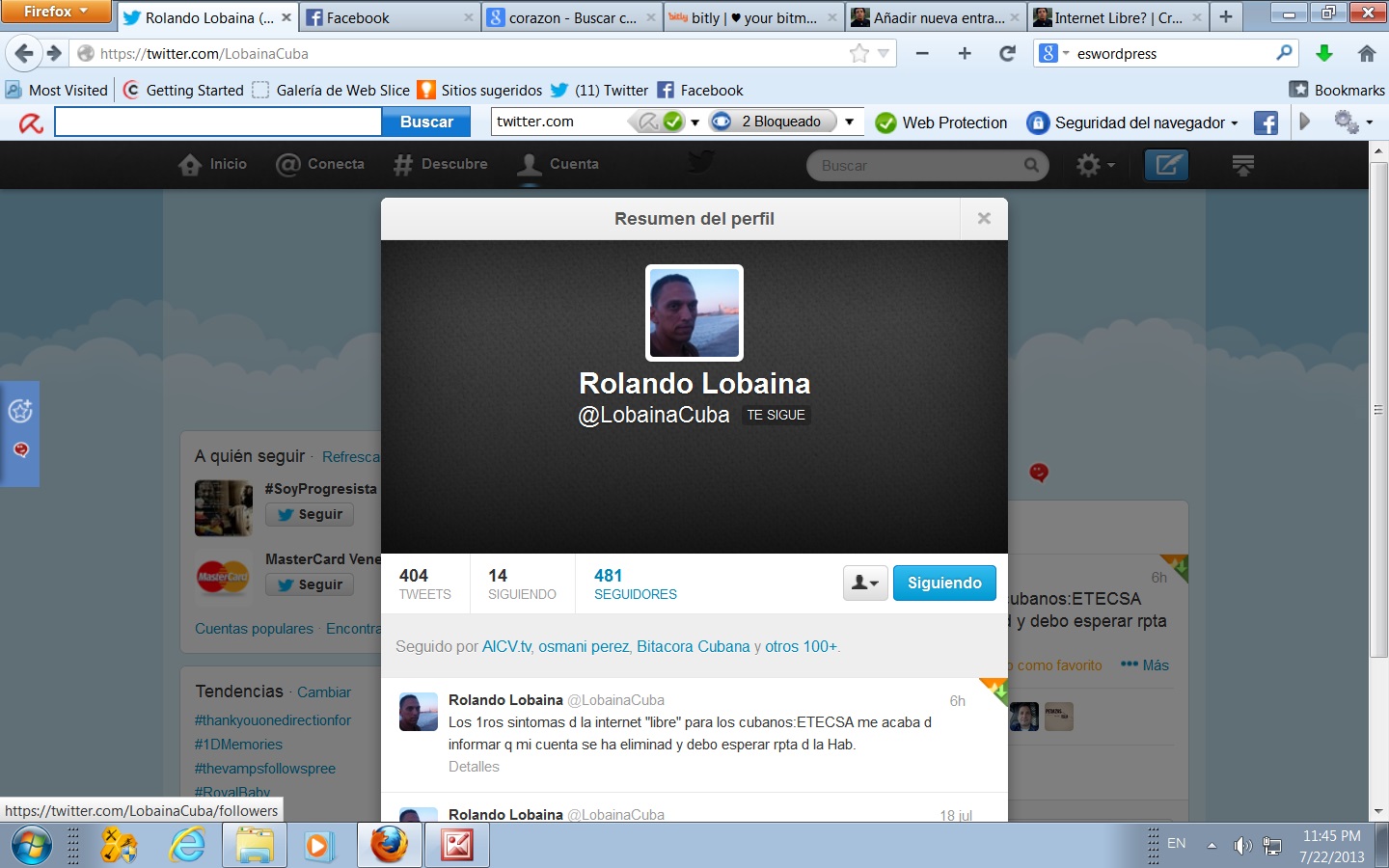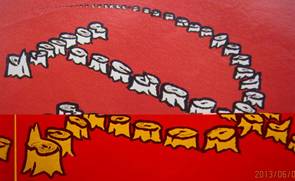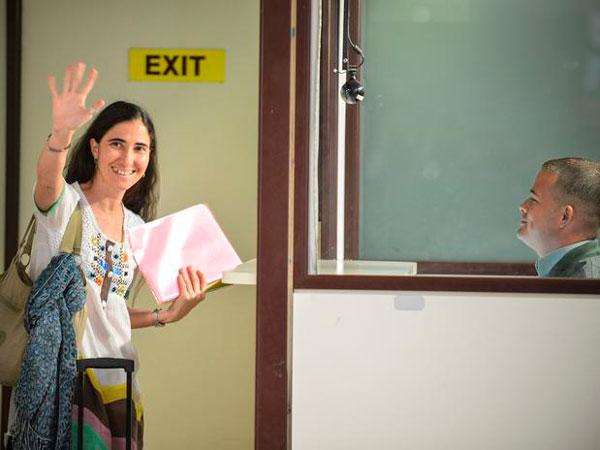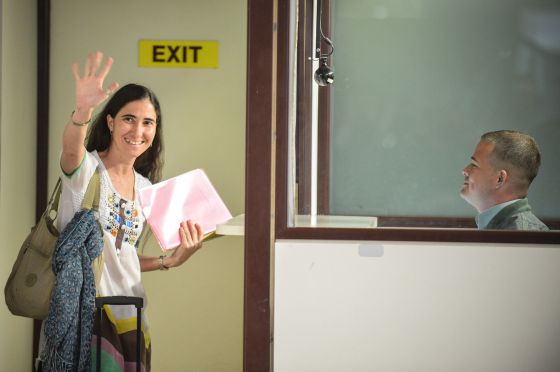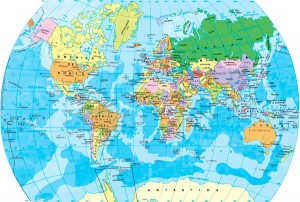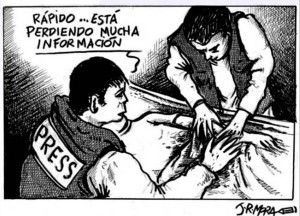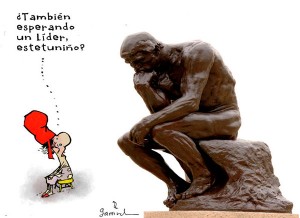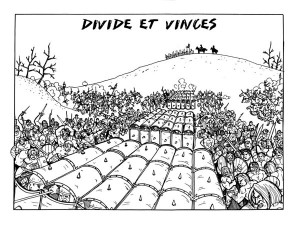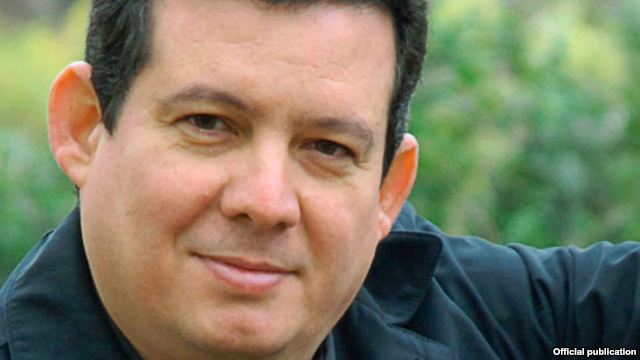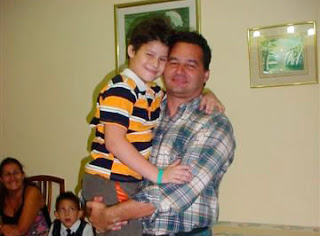
The writer Angel Santiesteban Prats and his son Eduardo Ángel some years ago.
By Amir Valle
The strategy of UNEAC and certain “disinformed” writers against Ángel Santiesteban
One more shame falls on the Writers and Artists Union of Cuba. This time, the shame is a dirty attack, manipulative and disloyal, against Ángel Santiesteban.
I read it in the blog “The Unknown Island,” by the Cuban essayist and journalist Enrique Ubieta, and it appears to be signed in principle by eight women, among whom we find some of the writers most admired for their work. But more than these signatures, what catches my attention is their taking advantage of the accusation against Angel Santiesteban to call for a struggle against violence toward women and to initiate with this article (embarrassingly manipulative) a campaign to collect signatures.
It is, in short, another step in the campaign to criminalize Ángel Santiesteban.
The initial question that I pose to the signatories is this: The person or persons who have hatched this campaign, have they had the decency to give you access to the documents that both the prosecutor and the attorney used in the trial? I, from Germany, only had to ask that they send me everything by email, and it was enough for me to read both files: Prosecution and Defense, to add my name to the call that we, his colleagues and friends, have made internationally in support of someone like Ángel Santiesteban.
I write these words from the deep respect that I feel for women, whom as a Christian I consider the most perfect creation of God. I have demonstrated this in my life and my professional career. Just this March 8, when you signed this document, I marked 16 years of marriage with a woman I consider responsible for all the good things I’ve done since I’ve known her.
And just as you were signing, I gave a lecture on literature written by women in Cuba, in which, of course, I mentioned some of you, proud of having been a witness to one of the most solid literatures written by women in the Spanish language, and, moreover, proud, until today, of being the only Cuban writer who decided one day to discover, promote and include in four anthologies the work of these Cuban women writers. As you surely know, I’m proud to say that many of the most important women writers in Cuba today saw their first stories published in my anthologies.
The lie is lame
“The truth always catches up with the lie, now matter how much it runs.”
I believe in that maxim. I know the mechanism for soliciting this type of signature: They ask you to sign against something or someone without putting all the real cards on the table; they want you to come out against something or someone only explaining to you the official version, the part of the facts that suits them. For that reason I have decided to write to you (and to those who want to read this article), inviting them (inviting everyone), to respond with dignity and integrity to these questions.
A brief introduction
I am one of the few people who can witness directly from the beginning the relationship between Ángel Santiesteban and Kenia Rodríguez, the mother of Eduardito, this boy they both conceived.
At that time, I lived in Ángel’s house and was very close to the beginning of this love story, diverted today, sadly, into hatred. I remember that Ángel brought only virtue and a better life from the beginning of their relationship. Kenia worked in a Chinese restaurant, and thanks to Ángel’s tenacity, she managed to start a UNEAC course in theater production. Years later I saw Kenia traveling abroad, accompanying Ángel on cultural trips.
Now Kenia is the complainant in the case for which he has been sentenced. I don’t know what little bird whispered in Kenia’s ear that made her, two and a half years after their separation as a couple, decide to initiate a series of personal accusations “oddly and coincidentally” just after Angel opened his blog, “The Children Nobody Wanted,” and his former wife began a steady love affair with a well-known artist. It would be good to note that Kenia, even acknowledging publicly that Ángel was an excellent father, forbade any relationship between the boy Eduardo and his father. Now it is known that, in secret from his mother, Eduardo sought out his father when he was barely 15-years-old.
Knowing Kenia as I do, I would like to make an appeal to her conscience so that she will see the light, so she will tell and defend the truth, without lending herself to any guy’s manipulations, above all for the well-being of the son that was born from this love; I call on the courts to reopen a case that, as the defense attorney showed, should be legally annulled because of the great quantity of procedural and judicial irregularities committed; and I call on the decency of those who have launched from their offices or those who have naively joined the campaign of criminalization without assessing the pure truth of the facts.
From my point of view, I noticed in the whole trial against Ángel Santeisteban sufficient evidence to strongly affirm that it’s a matter of an absurd and crude strategy by State Security to silence his voice. They are afraid of the impact that his criticisms could have, coming from a writer of his courage and reknown.
If I could find one single factor of merit that demonstrates Angel’s guilt in the crimes attributed to him, I never would have raised my voice in the way I did. I have even written that if Angel is guilty of something, he should be condemnded for that. But what we have seen, in the police work as well as in the judicial process, is so full of fraud, irregularities, violations and attempts at corruption and lies against Angel, that surely we can raise our voices to denounce this outrage.
We have rallied prestigious institutions (the majority of them not political) to take up our defense. And we have done it with proof in hand. I therefore encourage anyone who reads this article to offer answers substantiated by the truth to the following questions:
Why weren’t the complaints consistent from the beginning, and why did it take more than a month between the first and the last act, when according to the complaint it was a matter of a sequence of facts that occurred the same day? One month later did Kenia remember details that were supposed to be certain, that remained in her memory?
Why did the complainant present the medical certificate with a date previous to that of the complaint?
Why did the doctor, who supposedly signed the warrant, according to the declaration that is on record in the investigative file, not remember having attended her nor even remember the case?
Why did the complainant lie on the day of the trial, asserting that she was taken to the hospital, accompanied by the police, after making the complaint, if the date of the warrant shows that it was prepared one day before?
Why did the Provincial Court accept these lies, in spite of the attorney’s claim in the closing statement of the oral hearing? Why did the Supreme Court, which is supposed to be the petitioner in charge of ensuring the facts, not see that these violations didn’t occur?
Why, as was verified later, did Mayor Pablo, Chief of the heads of the Plaza Municipality sectors, who was involved in a love affair with the complainant, pressure the prosecution witness to not recant, and for what motive did he advise Kenia Rodriguez, according to the same informer, to confess before Angel and his son?
Why was the case file reopened after having been archived upon determining that there was no cause to send it to the Prosecutor and open a lawsuit?
Why reopen a file when never before did they take Kenia’s accusations seriously (performing only the bureaucratic process of listening to her), upon the evidence, according to the investigator’s own words, of Kenia’s nervous disorder and the constant sham and inconsistencies in her declarations? Why did the complainant commit blunders when referring to them?
If there aren’t political reasons, why try to convert a man considered an exemplary citizen and a distinguished writer into a public monster at the moment he decides to publish criticisms about the Cuban political reality through his blog? Why does this campaign of criminalization coincide so well with his being marginalized in the national culture?
Why was the file forgotten (archived) just until the invitation from the First Festival of the Word in Puerto Rico arrived, where Ángel Santiesteban would participate together with a group of intellectuals (from the Left, but with positions critical toward the political reality in Cuba)? Why did they “casually” cite him with urgency and decide to impose on him a bail of $1,000 pesos, thereby preventing his participation in the said event, which has international prestige in literary circles? Why, just at the moment when the international impact of his blog would grow and just when he would enjoy the promotion of his work and critical labor as a blogger in an international festival did they decide to impose on him the precautionary measure?
Why did they send the case investigator (yes, the same person who had archived the file) on a different tack, and mysteriously extract the file to take it to another police unit with another investigator? Why did this investigator reopen everything trying to implicate Santiesteban during three years, without being able to find the least glimmer of evidence that would tie him to the facts? What obliged this investigator to pressure, blackmail and harass the witnesses, investigating them in their neighborhoods and spreading the rumor that the neighbors might be implicated in the murder of a foreigner? Why, as these witnesses confessed, were they pressured to give up their decision to testify in favor of Angel?
Why did they wait three and one-half years to have the oral hearing? Why after setting it for the day of April 3, 2009, did they suspend the hearing? Why did they violate in such a flagrant manner the Penal Code that establishes that once a date is ratified and the parties notified, the matter can’t be suspended and they can’t return to an investigation, except if new evidence comes up in the same oral hearing that the Court needs to investigate? Did they not understand that no elements existed to judge the accused and sanction him, as they finally did? Did they understand that it was too obvious that they were committing an unwise injustice and, later, if they didn’t prepare well, they wouldn’t be able to justify the punishment for lack of evidence?
Why did the file travel several times to the Provincial Court after being dismissed each and every one of these times?
Why did they have to threaten the first attorney, as she herself admitted, obliging Angel to look for another legal representative who would not let himself be pressured?
Why did the Prosecutor, police and the complainant (in my opinion encouraged by the impunity they felt at being supported by State Security) set up a false “witness” who, thanks to the astuteness of Santiesteban’s friends, they were able to unmask? Why did the judges not throw out a case obviously invented, before the overwhelming evidence of this video where the false witness relates the pressure he received from the police to declare himself against Santiesteban? Why did Kenia, if she knew the truth, need to bribe the witness, as he could compromise himself in the video where the same witness exhibits the gifts he received as a bribe?
Why, from the time that Santiesteban said he knew about the video (authenticated as real and valid by an experienced official), did the Prosecutor find himself obligated to withdraw these crude accusations that, among other things, were accumulating the exorbitant sum of 54 years in prison for the extensive and fastidious list of false accusations? Why, upon seeing them discovered so clearly, did they have to dismiss the 15 years the Prosecutor was requesting as punishment for all the supposed crimes?
Why starting from this moment, instead of annulling the case because of the amount of irregularities (perjury of the claimant and demonstration of her intention to harm Angel at all cost) did they decide to return the file to the investigative phase, to readjust it and continue with their malevolent plan? Why and for whom did they study it for several months in the police unit, and later in the Provincial Prosecutor’s office?
Important and suspect: Why was the file requested from the General Prosecutor of the Republic?
Something else important and suspect: Why did the file record, in a note signed and sealed by the police investigator, “Urgent Interest of the Minister”? Why was a supposed case of “domestic violence” handled at the highest level of the Ministry of the Interior?
Still more important and more suspect: If there were no political plot behind all this, why was the file sent from the General Prosecutor to the General Headquarters of State Security in Villa Marista, according to what Santiesteban’s attorney was told in the same General Prosecutor’s office? Why, if the General Prosecutor of the Republic said that the file was in Villa Marista, when the defense attorney presented himself at Villa Marista, did they deny that the file was there? What did they have to hide?
Why did the Investigator continue with this false report, if, in spite of his bold attempt to implicate Santiesteban, he could not manage to set a trap?
Why did the Prosecutor, beginning with the aforementioned video of the false testimony, feel obligated to withdraw the complaints, leaving only the minor offenses: “home invasion and injuries”? Why did they keep these accusations, if the same video had already proven that Kenia Rodriguez was lying, for which she could be prosecuted for the crime of perjury, which was not done?
If it was a matter of a supposed ordinary crime, why did they hold the trial in the Main Hall of State Security, in the special headquarters in Carmen and Juan Delgado? Why were members of State Security posted outside? Why, as many witnesses could substantiate, were buses distributed “with veterans and enthusiastic people who spontaneously agree to defend their revolution”?
Why did the Court put Santiesteban in the totally indefensible position of not being able to call his own witnesses? Why, in return, did it keep the flimsy prosecution “witnesses”, all of them State functionaries and soldiers, obviously conspiring to try to give some credibility to the sanction, which, surely, had already been handed down?
How is it possible that a court can accept as convincing truth the testimony of the handwriting expert who stated that Angel was guilty because of the “size and inclination of his writing”, when the defense lawyer demonstrated scientifically and legally that handwriting, according to international norms, cannot ever be considered a conclusive truth?
Why did the Court reject the defense attorney’s testimony that, thanks to his friendship with the complainant, he could affirm that Kenia Rodriguez had told him on several occasions of her intentions to cause harm to the father of her son, meaning to Angel? Why also did they not take into account the declarations of the boy’s teacher (the Director of his school, considered a dependable person), who stated that the child confessed to him that his mother obliged him to lie about his father to damage his public image? Why also, “curiously” did they throw out the statements of three other witnesses, who showed that Angel Santiesteban was somewhere else just at the time that Kenia, supposedly, was being abused by him?
Why did the professionals, who attended the oral hearing–the lawyers, ex-prosecutors, intellectuals–after hearing the parties, agree that Angel was innocent and should be absolved, that absolutely nothing was presented that would incriminate him, except the declaration of the Lieutenant Colonel (the handwriting expert), who stated that he was guilty because of his inclined handwriting?
It’s enough to appeal to a little decency, a small quota of ethics, in order to conclude, before these terrible irregularities, that all this, even though it appears to be a joke, is a stifling and hallucinatory sin.
But if they weren’t enough, I want answers to some more questions:
Important proof of infamy: Why did the State Security official known as Camilo, after beating up Angel Santiesteban, November 8, 2012, tell him, ”Aren’t the five years years we’re going to toss at you enough?”? In front of a witness, Eugenio Leal, Angel said, “Some day you will pay for your abuse,” and Camilo responded, “When I pay, you already will have.” How could Angel Santiesteban, thanks to agent Camilo, alert the international community about his sentence one month before the Court sentenced him?
Why was the sentence excessive, as the defense showed in the appeal, if the court recognizes Santiesteban as a citizen who is distinguished by his intellectual work, nationally and internationally, and there are no prior offenses, circumstances that, according to Cuban legislation, are attenuating, which could drastically reduce any sentence?
Why do multiple cases exist in this same Court, processed for the same supposed crime, sometimes with weapons involved and with people with a full criminal history, and in none of the cases did the sentences come close to five years’ deprivation of liberty?
Why, again “curiously”, did the Court make a mistake in the second clause, which added one more year to the sentence? Why wasn’t this annulled, as established by law for this type of procedural “error”?
Why did the Superior Court, which had a decent opportunity to amend the scope of this injustice, catalogue as “without place” (meaning, they didn’t accept it) the diligently-researched file presented by the lawer as a Cause for Appeal, in the face of the enormous list of irregularities committed in this case?
I have many other questions. I only ask whoever reads this article that they don’t judge without having the evidence. To the present and future signatories of this call for signatures, “Zero Tolerance for Violence against Women”, that UNEAC now brandishes, deceitfully, taking advantage of Angel Santiesteban’s case, I now remember that in the history of our country, we intellectuals have been participants in many injustices simply by not searching for the truth and by conforming ourselves to what our government officials tell us.
I, convinced by the evidence of Angel’s innocence, continue asking these questions. I don’t expect them to be answered, although perhaps they should be.
Why did Kenia Rodriguez, the supposed victim, if she were convinced of the solidity of her accusations, tell her son that she conceived him with Angel’s love, and “that I never thought to bring a lawsuit”?
Why and who, again “casually”, decided and authorized that they wait until the International Book Fair in Havana conclude to emprison the writer Angel Santiesteban if the sentence was already handed down?
Why does Angel Santiesteban now not falter, if he is an intelligent and humble man, who other times has seen fit to publicly recognize the mistakes in his personal and professional life?
Why does he feel so proud to find himself in prison?
Why has he decided to give State Security a lesson in principles and loyalty to his ideas, reminding them with his performance and his writings that this move against him is simply a punishment, an underhanded message about power against Cuban intellectuals and the martyrdom that those who decide to rebel against the establishment can suffer?
They do what they can do against Angel, and I am certain that History will reclaim him some time as one of the cleanest, most transparent intellectuals and brave fighters of his time inside Cuba in these so-convulsed times that we Cubans live in. I know him with his virtues and his defects. I feel proud to be a member of his generation of writers; I am filled with pride at his brotherhood, and I feel proud to be the friend of one of these Cubans who, from the island, fights so that all of us can have the right to think with our own heads, have our differences respected, express our criticisms and nonconforming politics, without being catalogued by the government with the classic, trite, derogatory labels that up to today they have used, those who defend totalitarian thought, which, happily, each day that passes, has more cracks in Cuba.
Published under “Personal Thoughts”, Amir Valle’s blog.
Translated by Regina Anavy
Spanish post
9 March 2013
 From the same instant in which General Raul Castro was enthroned as President, he hasn’t stopped warning that “The battle against crime and corruption has no room for doubt.” On many occasions he has been seen at the podium exhorting publicly the members of his cabinet to maintain an “implacable” conduct against the mentioned scourge.
From the same instant in which General Raul Castro was enthroned as President, he hasn’t stopped warning that “The battle against crime and corruption has no room for doubt.” On many occasions he has been seen at the podium exhorting publicly the members of his cabinet to maintain an “implacable” conduct against the mentioned scourge.
